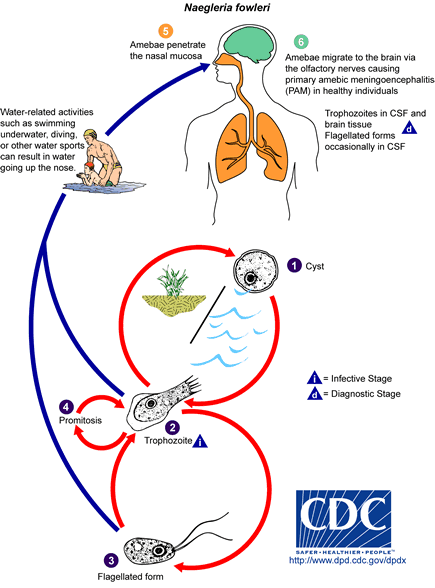A Kingston, NY woman has reportedly died after contracting the “brain-eating amoeba”, Naegleria fowleri, according to a Daily Freeman report Thursday. The deceased is identified as 19-year-old Kerry Stoutenburgh, a film student at CUNY Brooklyn College.

According to the report, Stoutenburgh died Wednesday at HealthAlliance Hospital’s Broadway Campus in Kingston with the diagnosis of “Naegleriasis,” although the situation is still under investigation.
On a GoFundMe page for Kerry Stoutenburgh, she contracted the parasite while vacationing in Maryland. Neither New York nor Maryland has ever had a reported Naegleria fowleri case reported prior to this.
Naegleria fowleri is a relatively rare, pathogenic amoeba found in warm or hot freshwater like lakes, rivers and hot springs. It is also possible to get it from dirty unchlorinated or under-chlorinated swimming pools. This parasite is found worldwide and in the United States, it is found mainly in the southern-tier states.
People typically get it by swimming, jumping or playing in freshwater and get the water up their nose. From there the parasite travels to the brain and spinal cord and necrotizes or basically eats brain tissue. The disease is known as primary amoebic meningoencephalitis (PAM) and it has a very rapid progression.
Typical symptoms may start after a day or two; headache, fever, nausea and vomiting. Later symptoms may include seizures, irrational behavior, hallucinations and finally coma and death. The course of the disease typically last about a week. Because the symptoms are very similar to bacterial meningitis, PAM may not even be considered in the diagnosis.
This is the fifth case reported in the US in 2016. Of the approximately 140 cases reported in the US since 1962, four people have been known to survive. The lethal amoeba carries with it a 97 percent fatality rate.
Related:
- Miltefosine and the 4th Naegleria fowleri survivor: Talking with Profounda CEO, Todd MacLaughlan
- Naegleria fowleri drug research: An interview with Dennis Kyle, PhD
- South Carolina reports Naegleria fowleri infection in resident
- Naegleria fowleri: Rapid treatment credited with saving Sebastian DeLeon’s life
- ‘Brain-eating amoeba’ drug available at Tampa VA: Profounda CEO


One thought on “Naegleria fowleri: New York woman dies after contracting amoeba in Maryland”